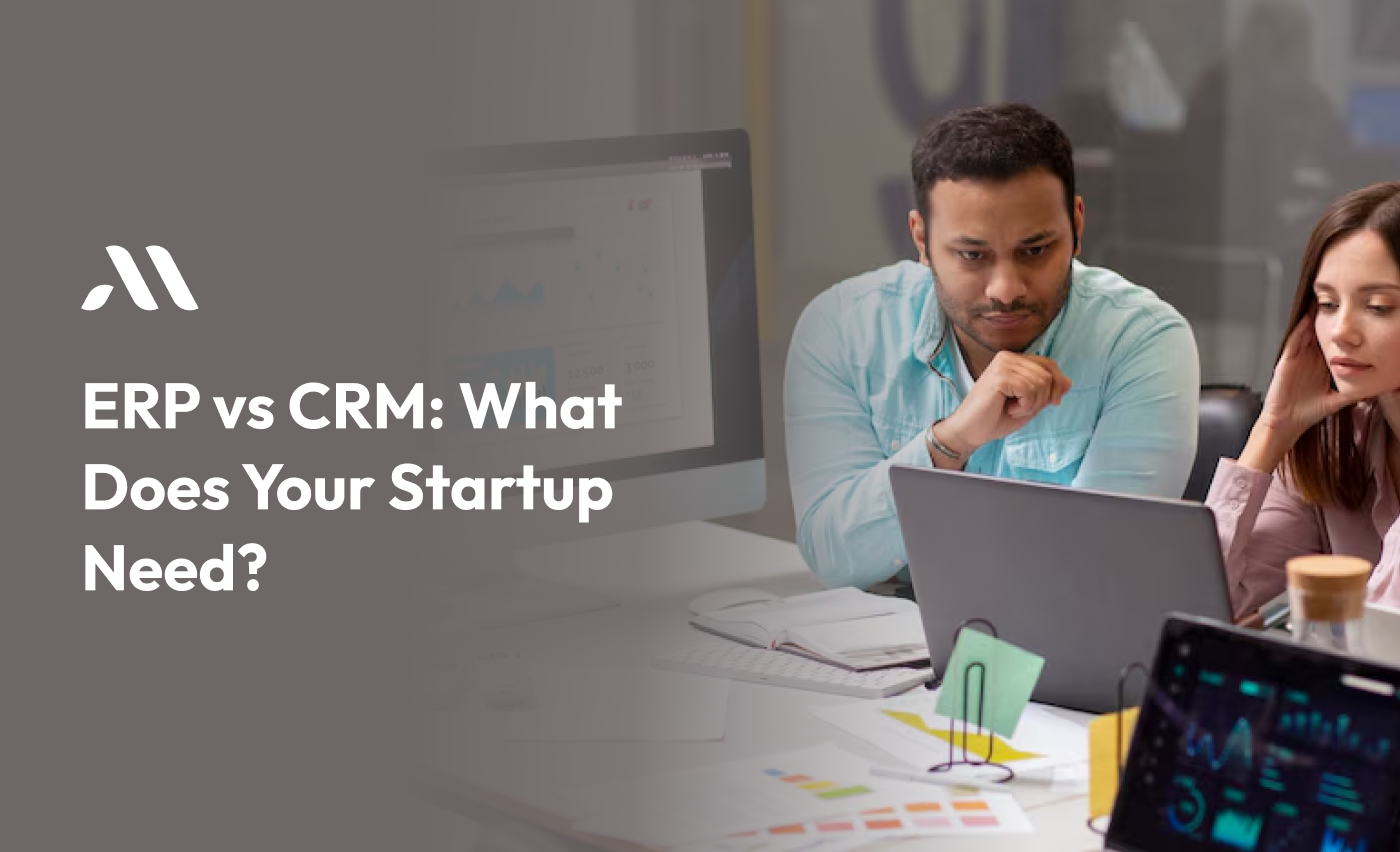Starting a new business comes with many challenges. One big decision is choosing the right software to manage your operations. For most startups, the choice boils down to two options: ERP or CRM. But what’s the difference? And which one does your startup really need? In this article, we’ll break down ERP vs CRM in simple terms, so you can make the right choice for your business.
According to recent studies by Statista, about 53% of companies use ERP software to manage their businesses, while 91% of businesses with 10 or more employees use a CRM system. This shows that both ERP and CRM are popular, but CRM systems are more commonly used, especially in smaller startups.
What Is ERP?
ERP stands for Enterprise Resource Planning. It’s a system that helps you manage many parts of your business in one place. From finance and inventory to human resources and purchasing, ERP software keeps everything organized. Think of it as the heart of your business that pumps information where it’s needed most.
Most Custom ERP Development Companies provide solutions that fit your specific needs. You can start with basic features and add more as your startup grows.
Note: If your business involves managing multiple tasks like accounting, sales, and human resources, ERP might be what you need.
What Is CRM?
CRM stands for Customer Relationship Management. It’s all about keeping your customers happy. CRM software helps you keep track of customer information, sales, and interactions. With a CRM, you know who your customers are, what they’ve bought, and what they might need next. This makes it easier to build strong relationships.
Many startups turn to a Custom CRM Development Company to create CRM systems that work best for their customer needs.
Tip: If your main focus is growing your customer base, improving sales, and keeping track of customer data, CRM could be your top choice.
ERP vs CRM: The Key Differences
Let’s break it down:
Main Focus:
- ERP manages everything, from finances to employee management.
- CRM focuses only on your customers and sales.
Who Uses It:
- ERP is for businesses that need help in multiple areas like accounting, inventory, and human resources.
- CRM is perfect for businesses focused on customer growth and improving sales.
Cost:
- ERP systems can be more expensive because they manage more parts of your business.
- CRM systems are generally cheaper since they focus on fewer areas.
Remember: Both ERP and CRM are useful, but they solve different problems. Knowing which one to pick depends on your business goals.
“ERP software is the backbone of many companies, but CRM is the face that connects with customers,” says Jane Smith, CEO of a leading Custom ERP Development Company.
When Does Your Startup Need ERP?
Here are some situations where an ERP system is more helpful for your startup:
Managing Finances: If your business is growing and you need better control over your finances, ERP can help you keep track of expenses, sales, and profits.
Inventory Control: If you have products to sell, an ERP system can help you manage your inventory, making sure you never run out of stock.
Multiple Departments: If you have different departments like sales, HR, and customer support, ERP can connect everything, so no department works in isolation.
Note: Many startups make the mistake of waiting too long before implementing ERP. It’s better to start early when your business is still small and manageable.
When Does Your Startup Need CRM?
Now let’s talk about CRM. Here’s when a CRM system makes more sense:
Building Customer Relationships: If your startup is focused on building strong relationships with customers, CRM is the way to go. It helps you understand who your customers are and what they need.
Sales Growth: If growing sales is a key goal for your startup, CRM can help you track leads, close deals, and see who your top customers are.
Customer Service: If customer service is a top priority for your business, CRM can help you track every customer interaction, making it easier to solve problems and keep customers happy.
Tip: If you’re still unsure, start with a CRM system to build your customer base, then add an ERP system as your business grows.
Can You Use Both ERP and CRM?
Yes! Many startups find that they need both ERP and CRM to run their businesses effectively. You can start with one system and add the other as you grow.
“Combining ERP and CRM systems can help startups achieve a perfect balance between managing operations and customer satisfaction,” says John Doe, founder of a top Custom CRM Development Company.
Also Read - ERP Implementation Challenges and How to Overcome Them
How to Choose Between ERP and CRM
Choosing between ERP and CRM depends on what your startup needs the most. Here are some questions to ask yourself:
What’s your top priority?
- If your main focus is managing finances, inventory, and operations, go for ERP.
- If your main focus is on sales, customer service, and building relationships, choose CRM.
What’s your budget?
- ERP systems tend to be more expensive because they cover more areas of your business.
- CRM systems are more affordable and can give you a quick boost in sales and customer satisfaction.
How fast is your business growing?
- If your startup is growing fast and you need help managing many tasks, ERP is the better choice.
- If you’re focused on growing your customer base first, start with a CRM.
Remember: You don’t have to choose one or the other right away. Start with the system that solves your most urgent problem, then add the other as your business expands.
ERP vs CRM: Final Thoughts
In the battle of ERP vs CRM, the best choice depends on what your startup needs right now. ERP helps you manage all parts of your business, while CRM focuses on growing customer relationships. Both are valuable, but each serves a different purpose.
Many Custom ERP Development Companies and Custom CRM Development Companies provide solutions customized to startups. Whether you need help managing your operations or building your customer base, you can find a system that fits your needs.
Tip: Start by evaluating your business goals. If you need help managing operations, ERP is a smart investment. If customer growth and sales are your main focus, CRM should be your first step.
Conclusion
Choosing between ERP and CRM doesn’t have to be complicated. It’s all about understanding your startup’s needs and picking the tool that helps you the most. Whether you choose ERP, CRM, or both, the right system will help you grow your business faster and smarter.
Looking for the right software for your startup? MicraSol can help! Whether you need an ERP to manage operations or a CRM to boost customer relationships, we’ve got you covered. Let us develop the perfect app solution to fit your needs. Contact MicraSol today and grow your business!
FAQS
1. What is the main difference between ERP and CRM?
- ERP helps manage your entire business, including finances, inventory, and employees.
- CRM focuses only on managing customers and sales.
Think of ERP as the brain behind running your business and CRM as the tool to keep your customers happy!
2. Which one is better for my startup: ERP or CRM?
It depends on what your startup needs:
- If you need help managing finances, inventory, or other tasks, go with ERP.
- If your goal is to grow customer relationships and boost sales, CRM is a better choice.
3. Can my startup use both ERP and CRM together?
Yes! Many startups use both ERP and CRM. You can start with one and add the other when your business grows.
4. Is ERP more expensive than CRM?
Yes, ERP systems usually cost more because they manage many different parts of your business. CRM systems tend to be cheaper since they only focus on customers and sales.
5. When should my startup get an ERP system?
You should get an ERP system if:
- Your business is growing fast.
- You need help managing many tasks like accounting, HR, and inventory.








